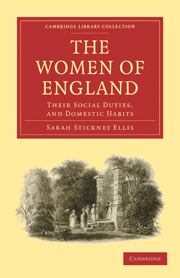Summary
The respect paid by women to public opinion, and to the conventional rules of society, might have been considered with some propriety under the head of love of admiration, did not the immediate connexion of this subject with that of integrity, render it more suited to the present chapter.
To use a popular Germanism, it is but a one-sided view of the subject that we take, when we suppose that the hope of being admired is the strongest stimulus to the female character in all cases where her conduct is referred to public opinion. The dread of being censured or condemned, exercises, I am inclined to think, a far more extensive influence over her habits and her feelings. Any deviation from the fashionable mode of dress, or from the established usages of polished life, present an appalling difficulty to a woman of ordinary mind brought up under the tutelage of what is called the world. She cannot—positively cannot—dare not—will not do any thing that the world has pronounced unlady-like. Nor, while she lives in the world, and mixes in polished society, is it at all desirable that she should deviate from such universally acknowledged rules, except where absolute duty leads her into a different line of conduct. I should be the last person to advise a woman to risk the consequences of such deviations, simply for the sake of being singular; because, I regard the assumption of singularity for its own sake, as one of the most absurd of all the varied specimens of affectation which human life affords.
- Type
- Chapter
- Information
- The Women of EnglandTheir Social Duties, and Domestic Habits, pp. 298 - 320Publisher: Cambridge University PressPrint publication year: 2010First published in: 1839

